The Impact of Entrepreneurship on Economic Growth
VerifiedAdded on 2024/01/17
|8
|2934
|135
AI Summary
This paper discusses the impact of entrepreneurship on economic growth and how it affects innovation, competition, and productivity. It explores the relationship between entrepreneurship and economic growth at the individual, firm, and macro levels.
Contribute Materials
Your contribution can guide someone’s learning journey. Share your
documents today.
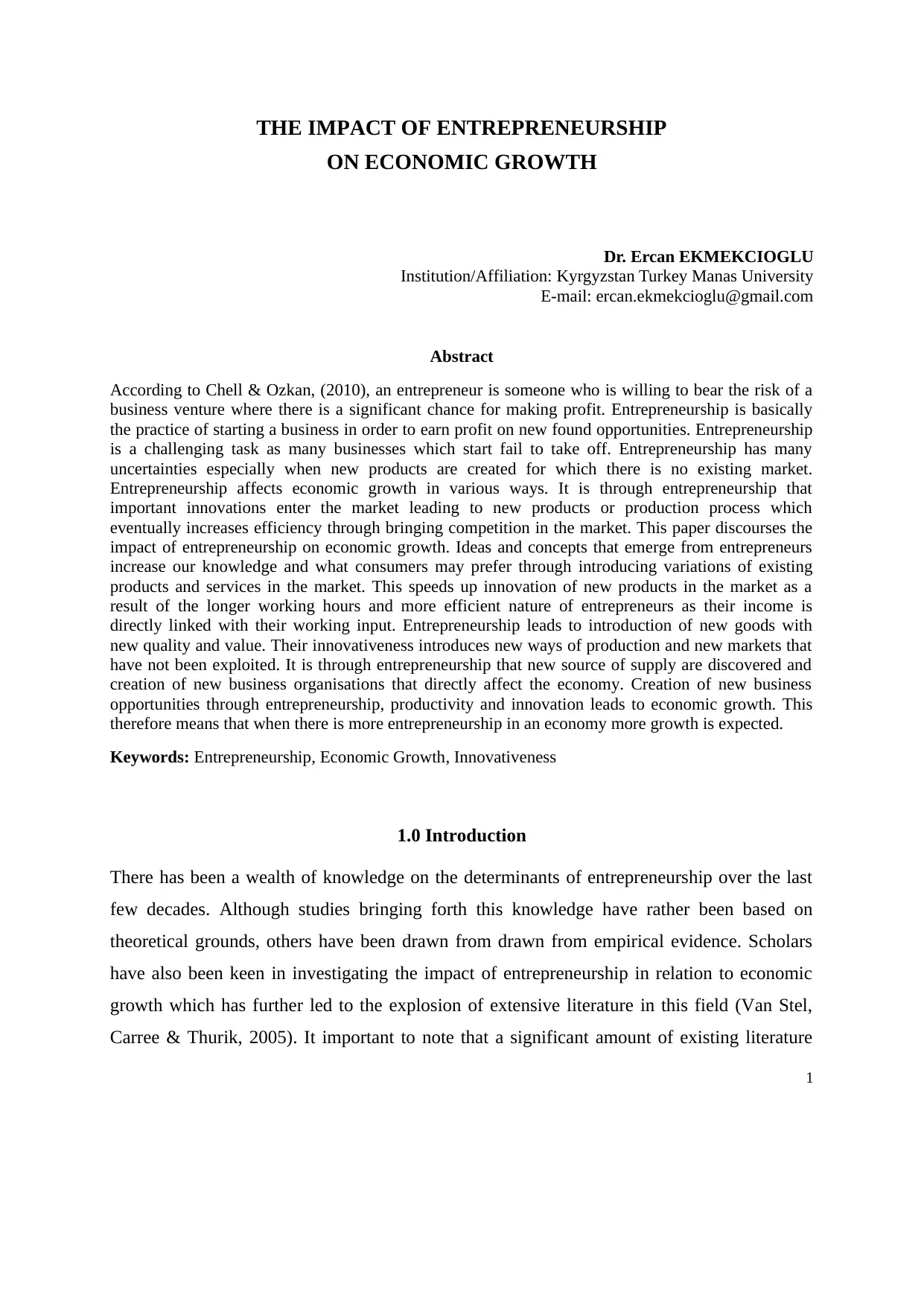
THE IMPACT OF ENTREPRENEURSHIP
ON ECONOMIC GROWTH
Dr. Ercan EKMEKCIOGLU
Institution/Affiliation: Kyrgyzstan Turkey Manas University
E-mail: ercan.ekmekcioglu@gmail.com
Abstract
According to Chell & Ozkan, (2010), an entrepreneur is someone who is willing to bear the risk of a
business venture where there is a significant chance for making profit. Entrepreneurship is basically
the practice of starting a business in order to earn profit on new found opportunities. Entrepreneurship
is a challenging task as many businesses which start fail to take off. Entrepreneurship has many
uncertainties especially when new products are created for which there is no existing market.
Entrepreneurship affects economic growth in various ways. It is through entrepreneurship that
important innovations enter the market leading to new products or production process which
eventually increases efficiency through bringing competition in the market. This paper discourses the
impact of entrepreneurship on economic growth. Ideas and concepts that emerge from entrepreneurs
increase our knowledge and what consumers may prefer through introducing variations of existing
products and services in the market. This speeds up innovation of new products in the market as a
result of the longer working hours and more efficient nature of entrepreneurs as their income is
directly linked with their working input. Entrepreneurship leads to introduction of new goods with
new quality and value. Their innovativeness introduces new ways of production and new markets that
have not been exploited. It is through entrepreneurship that new source of supply are discovered and
creation of new business organisations that directly affect the economy. Creation of new business
opportunities through entrepreneurship, productivity and innovation leads to economic growth. This
therefore means that when there is more entrepreneurship in an economy more growth is expected.
Keywords: Entrepreneurship, Economic Growth, Innovativeness
1.0 Introduction
There has been a wealth of knowledge on the determinants of entrepreneurship over the last
few decades. Although studies bringing forth this knowledge have rather been based on
theoretical grounds, others have been drawn from drawn from empirical evidence. Scholars
have also been keen in investigating the impact of entrepreneurship in relation to economic
growth which has further led to the explosion of extensive literature in this field (Van Stel,
Carree & Thurik, 2005). It important to note that a significant amount of existing literature
1
ON ECONOMIC GROWTH
Dr. Ercan EKMEKCIOGLU
Institution/Affiliation: Kyrgyzstan Turkey Manas University
E-mail: ercan.ekmekcioglu@gmail.com
Abstract
According to Chell & Ozkan, (2010), an entrepreneur is someone who is willing to bear the risk of a
business venture where there is a significant chance for making profit. Entrepreneurship is basically
the practice of starting a business in order to earn profit on new found opportunities. Entrepreneurship
is a challenging task as many businesses which start fail to take off. Entrepreneurship has many
uncertainties especially when new products are created for which there is no existing market.
Entrepreneurship affects economic growth in various ways. It is through entrepreneurship that
important innovations enter the market leading to new products or production process which
eventually increases efficiency through bringing competition in the market. This paper discourses the
impact of entrepreneurship on economic growth. Ideas and concepts that emerge from entrepreneurs
increase our knowledge and what consumers may prefer through introducing variations of existing
products and services in the market. This speeds up innovation of new products in the market as a
result of the longer working hours and more efficient nature of entrepreneurs as their income is
directly linked with their working input. Entrepreneurship leads to introduction of new goods with
new quality and value. Their innovativeness introduces new ways of production and new markets that
have not been exploited. It is through entrepreneurship that new source of supply are discovered and
creation of new business organisations that directly affect the economy. Creation of new business
opportunities through entrepreneurship, productivity and innovation leads to economic growth. This
therefore means that when there is more entrepreneurship in an economy more growth is expected.
Keywords: Entrepreneurship, Economic Growth, Innovativeness
1.0 Introduction
There has been a wealth of knowledge on the determinants of entrepreneurship over the last
few decades. Although studies bringing forth this knowledge have rather been based on
theoretical grounds, others have been drawn from drawn from empirical evidence. Scholars
have also been keen in investigating the impact of entrepreneurship in relation to economic
growth which has further led to the explosion of extensive literature in this field (Van Stel,
Carree & Thurik, 2005). It important to note that a significant amount of existing literature
1
Secure Best Marks with AI Grader
Need help grading? Try our AI Grader for instant feedback on your assignments.
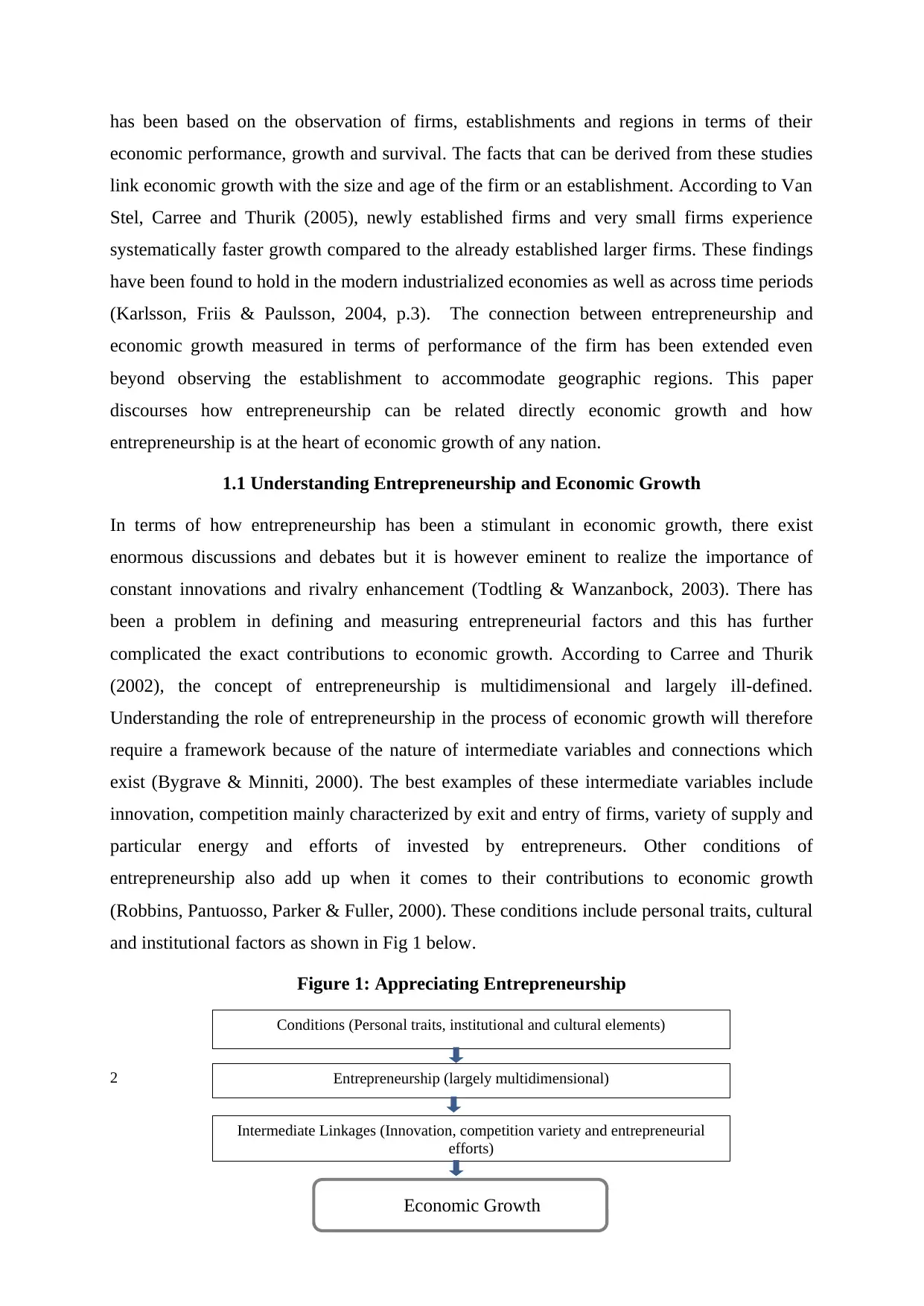
has been based on the observation of firms, establishments and regions in terms of their
economic performance, growth and survival. The facts that can be derived from these studies
link economic growth with the size and age of the firm or an establishment. According to Van
Stel, Carree and Thurik (2005), newly established firms and very small firms experience
systematically faster growth compared to the already established larger firms. These findings
have been found to hold in the modern industrialized economies as well as across time periods
(Karlsson, Friis & Paulsson, 2004, p.3). The connection between entrepreneurship and
economic growth measured in terms of performance of the firm has been extended even
beyond observing the establishment to accommodate geographic regions. This paper
discourses how entrepreneurship can be related directly economic growth and how
entrepreneurship is at the heart of economic growth of any nation.
1.1 Understanding Entrepreneurship and Economic Growth
In terms of how entrepreneurship has been a stimulant in economic growth, there exist
enormous discussions and debates but it is however eminent to realize the importance of
constant innovations and rivalry enhancement (Todtling & Wanzanbock, 2003). There has
been a problem in defining and measuring entrepreneurial factors and this has further
complicated the exact contributions to economic growth. According to Carree and Thurik
(2002), the concept of entrepreneurship is multidimensional and largely ill-defined.
Understanding the role of entrepreneurship in the process of economic growth will therefore
require a framework because of the nature of intermediate variables and connections which
exist (Bygrave & Minniti, 2000). The best examples of these intermediate variables include
innovation, competition mainly characterized by exit and entry of firms, variety of supply and
particular energy and efforts of invested by entrepreneurs. Other conditions of
entrepreneurship also add up when it comes to their contributions to economic growth
(Robbins, Pantuosso, Parker & Fuller, 2000). These conditions include personal traits, cultural
and institutional factors as shown in Fig 1 below.
Figure 1: Appreciating Entrepreneurship
2 Entrepreneurship (largely multidimensional)
Intermediate Linkages (Innovation, competition variety and entrepreneurial
efforts)
Conditions (Personal traits, institutional and cultural elements)
Economic Growth
economic performance, growth and survival. The facts that can be derived from these studies
link economic growth with the size and age of the firm or an establishment. According to Van
Stel, Carree and Thurik (2005), newly established firms and very small firms experience
systematically faster growth compared to the already established larger firms. These findings
have been found to hold in the modern industrialized economies as well as across time periods
(Karlsson, Friis & Paulsson, 2004, p.3). The connection between entrepreneurship and
economic growth measured in terms of performance of the firm has been extended even
beyond observing the establishment to accommodate geographic regions. This paper
discourses how entrepreneurship can be related directly economic growth and how
entrepreneurship is at the heart of economic growth of any nation.
1.1 Understanding Entrepreneurship and Economic Growth
In terms of how entrepreneurship has been a stimulant in economic growth, there exist
enormous discussions and debates but it is however eminent to realize the importance of
constant innovations and rivalry enhancement (Todtling & Wanzanbock, 2003). There has
been a problem in defining and measuring entrepreneurial factors and this has further
complicated the exact contributions to economic growth. According to Carree and Thurik
(2002), the concept of entrepreneurship is multidimensional and largely ill-defined.
Understanding the role of entrepreneurship in the process of economic growth will therefore
require a framework because of the nature of intermediate variables and connections which
exist (Bygrave & Minniti, 2000). The best examples of these intermediate variables include
innovation, competition mainly characterized by exit and entry of firms, variety of supply and
particular energy and efforts of invested by entrepreneurs. Other conditions of
entrepreneurship also add up when it comes to their contributions to economic growth
(Robbins, Pantuosso, Parker & Fuller, 2000). These conditions include personal traits, cultural
and institutional factors as shown in Fig 1 below.
Figure 1: Appreciating Entrepreneurship
2 Entrepreneurship (largely multidimensional)
Intermediate Linkages (Innovation, competition variety and entrepreneurial
efforts)
Conditions (Personal traits, institutional and cultural elements)
Economic Growth
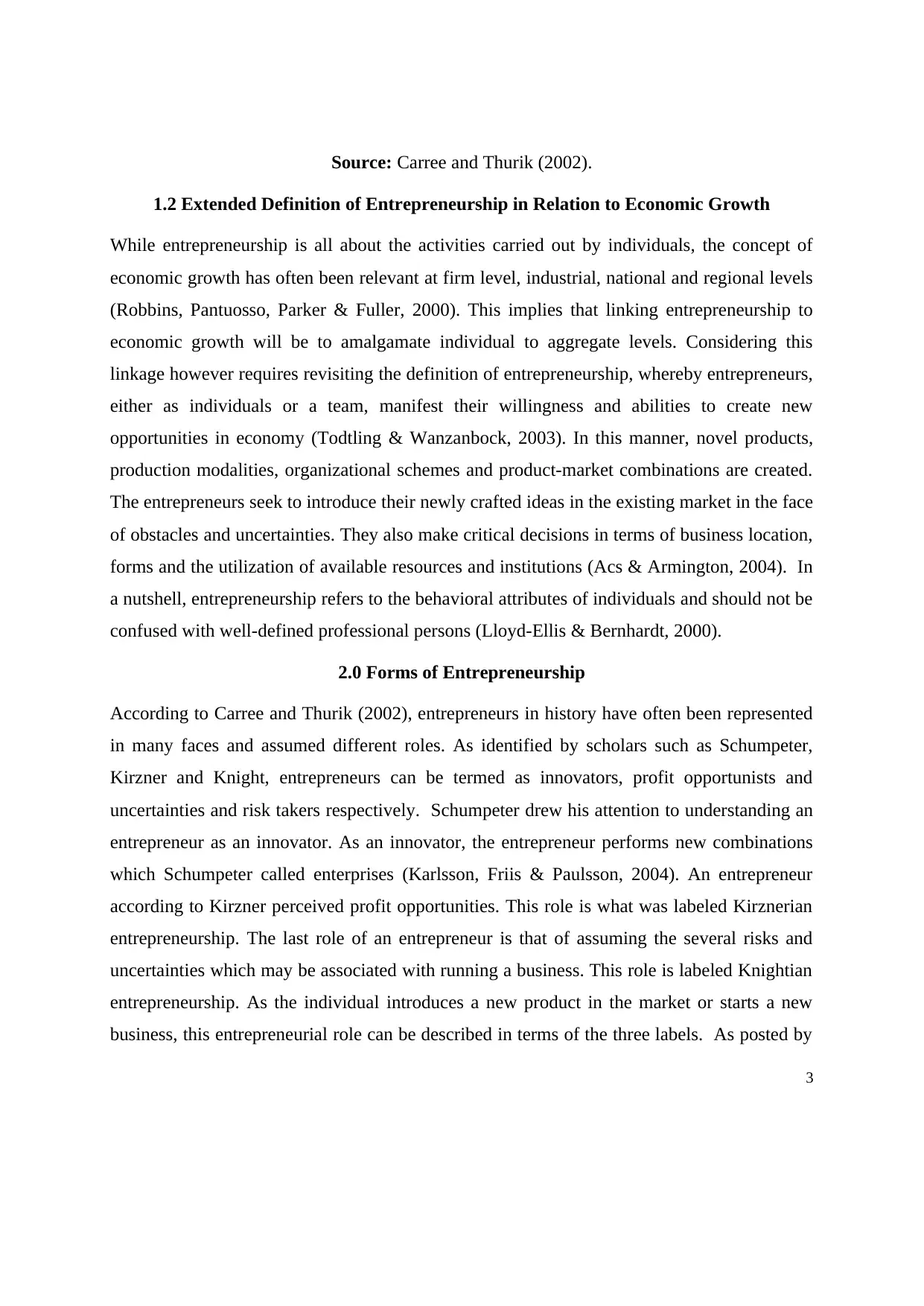
Source: Carree and Thurik (2002).
1.2 Extended Definition of Entrepreneurship in Relation to Economic Growth
While entrepreneurship is all about the activities carried out by individuals, the concept of
economic growth has often been relevant at firm level, industrial, national and regional levels
(Robbins, Pantuosso, Parker & Fuller, 2000). This implies that linking entrepreneurship to
economic growth will be to amalgamate individual to aggregate levels. Considering this
linkage however requires revisiting the definition of entrepreneurship, whereby entrepreneurs,
either as individuals or a team, manifest their willingness and abilities to create new
opportunities in economy (Todtling & Wanzanbock, 2003). In this manner, novel products,
production modalities, organizational schemes and product-market combinations are created.
The entrepreneurs seek to introduce their newly crafted ideas in the existing market in the face
of obstacles and uncertainties. They also make critical decisions in terms of business location,
forms and the utilization of available resources and institutions (Acs & Armington, 2004). In
a nutshell, entrepreneurship refers to the behavioral attributes of individuals and should not be
confused with well-defined professional persons (Lloyd-Ellis & Bernhardt, 2000).
2.0 Forms of Entrepreneurship
According to Carree and Thurik (2002), entrepreneurs in history have often been represented
in many faces and assumed different roles. As identified by scholars such as Schumpeter,
Kirzner and Knight, entrepreneurs can be termed as innovators, profit opportunists and
uncertainties and risk takers respectively. Schumpeter drew his attention to understanding an
entrepreneur as an innovator. As an innovator, the entrepreneur performs new combinations
which Schumpeter called enterprises (Karlsson, Friis & Paulsson, 2004). An entrepreneur
according to Kirzner perceived profit opportunities. This role is what was labeled Kirznerian
entrepreneurship. The last role of an entrepreneur is that of assuming the several risks and
uncertainties which may be associated with running a business. This role is labeled Knightian
entrepreneurship. As the individual introduces a new product in the market or starts a new
business, this entrepreneurial role can be described in terms of the three labels. As posted by
3
1.2 Extended Definition of Entrepreneurship in Relation to Economic Growth
While entrepreneurship is all about the activities carried out by individuals, the concept of
economic growth has often been relevant at firm level, industrial, national and regional levels
(Robbins, Pantuosso, Parker & Fuller, 2000). This implies that linking entrepreneurship to
economic growth will be to amalgamate individual to aggregate levels. Considering this
linkage however requires revisiting the definition of entrepreneurship, whereby entrepreneurs,
either as individuals or a team, manifest their willingness and abilities to create new
opportunities in economy (Todtling & Wanzanbock, 2003). In this manner, novel products,
production modalities, organizational schemes and product-market combinations are created.
The entrepreneurs seek to introduce their newly crafted ideas in the existing market in the face
of obstacles and uncertainties. They also make critical decisions in terms of business location,
forms and the utilization of available resources and institutions (Acs & Armington, 2004). In
a nutshell, entrepreneurship refers to the behavioral attributes of individuals and should not be
confused with well-defined professional persons (Lloyd-Ellis & Bernhardt, 2000).
2.0 Forms of Entrepreneurship
According to Carree and Thurik (2002), entrepreneurs in history have often been represented
in many faces and assumed different roles. As identified by scholars such as Schumpeter,
Kirzner and Knight, entrepreneurs can be termed as innovators, profit opportunists and
uncertainties and risk takers respectively. Schumpeter drew his attention to understanding an
entrepreneur as an innovator. As an innovator, the entrepreneur performs new combinations
which Schumpeter called enterprises (Karlsson, Friis & Paulsson, 2004). An entrepreneur
according to Kirzner perceived profit opportunities. This role is what was labeled Kirznerian
entrepreneurship. The last role of an entrepreneur is that of assuming the several risks and
uncertainties which may be associated with running a business. This role is labeled Knightian
entrepreneurship. As the individual introduces a new product in the market or starts a new
business, this entrepreneurial role can be described in terms of the three labels. As posted by
3
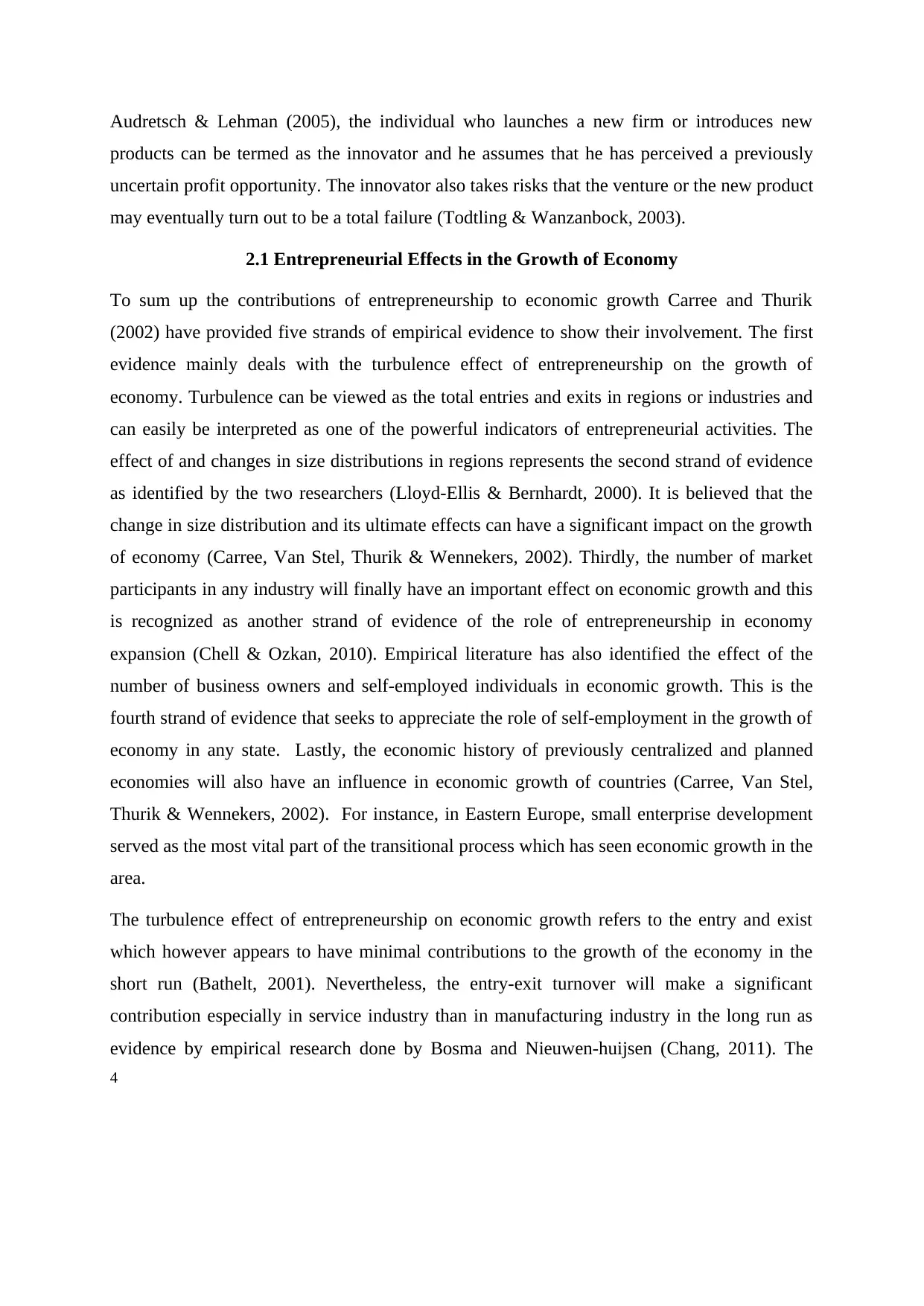
Audretsch & Lehman (2005), the individual who launches a new firm or introduces new
products can be termed as the innovator and he assumes that he has perceived a previously
uncertain profit opportunity. The innovator also takes risks that the venture or the new product
may eventually turn out to be a total failure (Todtling & Wanzanbock, 2003).
2.1 Entrepreneurial Effects in the Growth of Economy
To sum up the contributions of entrepreneurship to economic growth Carree and Thurik
(2002) have provided five strands of empirical evidence to show their involvement. The first
evidence mainly deals with the turbulence effect of entrepreneurship on the growth of
economy. Turbulence can be viewed as the total entries and exits in regions or industries and
can easily be interpreted as one of the powerful indicators of entrepreneurial activities. The
effect of and changes in size distributions in regions represents the second strand of evidence
as identified by the two researchers (Lloyd-Ellis & Bernhardt, 2000). It is believed that the
change in size distribution and its ultimate effects can have a significant impact on the growth
of economy (Carree, Van Stel, Thurik & Wennekers, 2002). Thirdly, the number of market
participants in any industry will finally have an important effect on economic growth and this
is recognized as another strand of evidence of the role of entrepreneurship in economy
expansion (Chell & Ozkan, 2010). Empirical literature has also identified the effect of the
number of business owners and self-employed individuals in economic growth. This is the
fourth strand of evidence that seeks to appreciate the role of self-employment in the growth of
economy in any state. Lastly, the economic history of previously centralized and planned
economies will also have an influence in economic growth of countries (Carree, Van Stel,
Thurik & Wennekers, 2002). For instance, in Eastern Europe, small enterprise development
served as the most vital part of the transitional process which has seen economic growth in the
area.
The turbulence effect of entrepreneurship on economic growth refers to the entry and exist
which however appears to have minimal contributions to the growth of the economy in the
short run (Bathelt, 2001). Nevertheless, the entry-exit turnover will make a significant
contribution especially in service industry than in manufacturing industry in the long run as
evidence by empirical research done by Bosma and Nieuwen-huijsen (Chang, 2011). The
4
products can be termed as the innovator and he assumes that he has perceived a previously
uncertain profit opportunity. The innovator also takes risks that the venture or the new product
may eventually turn out to be a total failure (Todtling & Wanzanbock, 2003).
2.1 Entrepreneurial Effects in the Growth of Economy
To sum up the contributions of entrepreneurship to economic growth Carree and Thurik
(2002) have provided five strands of empirical evidence to show their involvement. The first
evidence mainly deals with the turbulence effect of entrepreneurship on the growth of
economy. Turbulence can be viewed as the total entries and exits in regions or industries and
can easily be interpreted as one of the powerful indicators of entrepreneurial activities. The
effect of and changes in size distributions in regions represents the second strand of evidence
as identified by the two researchers (Lloyd-Ellis & Bernhardt, 2000). It is believed that the
change in size distribution and its ultimate effects can have a significant impact on the growth
of economy (Carree, Van Stel, Thurik & Wennekers, 2002). Thirdly, the number of market
participants in any industry will finally have an important effect on economic growth and this
is recognized as another strand of evidence of the role of entrepreneurship in economy
expansion (Chell & Ozkan, 2010). Empirical literature has also identified the effect of the
number of business owners and self-employed individuals in economic growth. This is the
fourth strand of evidence that seeks to appreciate the role of self-employment in the growth of
economy in any state. Lastly, the economic history of previously centralized and planned
economies will also have an influence in economic growth of countries (Carree, Van Stel,
Thurik & Wennekers, 2002). For instance, in Eastern Europe, small enterprise development
served as the most vital part of the transitional process which has seen economic growth in the
area.
The turbulence effect of entrepreneurship on economic growth refers to the entry and exist
which however appears to have minimal contributions to the growth of the economy in the
short run (Bathelt, 2001). Nevertheless, the entry-exit turnover will make a significant
contribution especially in service industry than in manufacturing industry in the long run as
evidence by empirical research done by Bosma and Nieuwen-huijsen (Chang, 2011). The
4
Secure Best Marks with AI Grader
Need help grading? Try our AI Grader for instant feedback on your assignments.
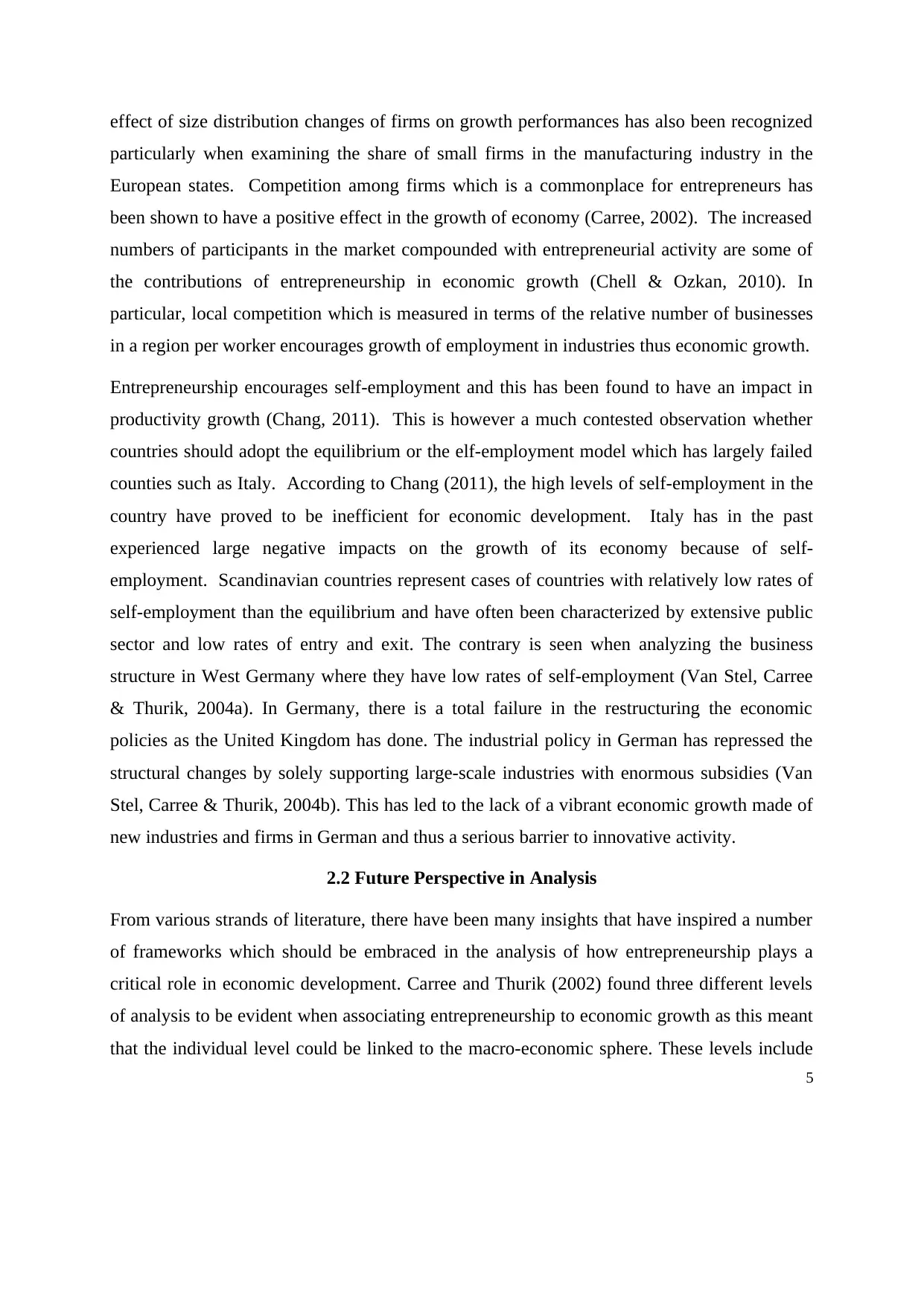
effect of size distribution changes of firms on growth performances has also been recognized
particularly when examining the share of small firms in the manufacturing industry in the
European states. Competition among firms which is a commonplace for entrepreneurs has
been shown to have a positive effect in the growth of economy (Carree, 2002). The increased
numbers of participants in the market compounded with entrepreneurial activity are some of
the contributions of entrepreneurship in economic growth (Chell & Ozkan, 2010). In
particular, local competition which is measured in terms of the relative number of businesses
in a region per worker encourages growth of employment in industries thus economic growth.
Entrepreneurship encourages self-employment and this has been found to have an impact in
productivity growth (Chang, 2011). This is however a much contested observation whether
countries should adopt the equilibrium or the elf-employment model which has largely failed
counties such as Italy. According to Chang (2011), the high levels of self-employment in the
country have proved to be inefficient for economic development. Italy has in the past
experienced large negative impacts on the growth of its economy because of self-
employment. Scandinavian countries represent cases of countries with relatively low rates of
self-employment than the equilibrium and have often been characterized by extensive public
sector and low rates of entry and exit. The contrary is seen when analyzing the business
structure in West Germany where they have low rates of self-employment (Van Stel, Carree
& Thurik, 2004a). In Germany, there is a total failure in the restructuring the economic
policies as the United Kingdom has done. The industrial policy in German has repressed the
structural changes by solely supporting large-scale industries with enormous subsidies (Van
Stel, Carree & Thurik, 2004b). This has led to the lack of a vibrant economic growth made of
new industries and firms in German and thus a serious barrier to innovative activity.
2.2 Future Perspective in Analysis
From various strands of literature, there have been many insights that have inspired a number
of frameworks which should be embraced in the analysis of how entrepreneurship plays a
critical role in economic development. Carree and Thurik (2002) found three different levels
of analysis to be evident when associating entrepreneurship to economic growth as this meant
that the individual level could be linked to the macro-economic sphere. These levels include
5
particularly when examining the share of small firms in the manufacturing industry in the
European states. Competition among firms which is a commonplace for entrepreneurs has
been shown to have a positive effect in the growth of economy (Carree, 2002). The increased
numbers of participants in the market compounded with entrepreneurial activity are some of
the contributions of entrepreneurship in economic growth (Chell & Ozkan, 2010). In
particular, local competition which is measured in terms of the relative number of businesses
in a region per worker encourages growth of employment in industries thus economic growth.
Entrepreneurship encourages self-employment and this has been found to have an impact in
productivity growth (Chang, 2011). This is however a much contested observation whether
countries should adopt the equilibrium or the elf-employment model which has largely failed
counties such as Italy. According to Chang (2011), the high levels of self-employment in the
country have proved to be inefficient for economic development. Italy has in the past
experienced large negative impacts on the growth of its economy because of self-
employment. Scandinavian countries represent cases of countries with relatively low rates of
self-employment than the equilibrium and have often been characterized by extensive public
sector and low rates of entry and exit. The contrary is seen when analyzing the business
structure in West Germany where they have low rates of self-employment (Van Stel, Carree
& Thurik, 2004a). In Germany, there is a total failure in the restructuring the economic
policies as the United Kingdom has done. The industrial policy in German has repressed the
structural changes by solely supporting large-scale industries with enormous subsidies (Van
Stel, Carree & Thurik, 2004b). This has led to the lack of a vibrant economic growth made of
new industries and firms in German and thus a serious barrier to innovative activity.
2.2 Future Perspective in Analysis
From various strands of literature, there have been many insights that have inspired a number
of frameworks which should be embraced in the analysis of how entrepreneurship plays a
critical role in economic development. Carree and Thurik (2002) found three different levels
of analysis to be evident when associating entrepreneurship to economic growth as this meant
that the individual level could be linked to the macro-economic sphere. These levels include
5
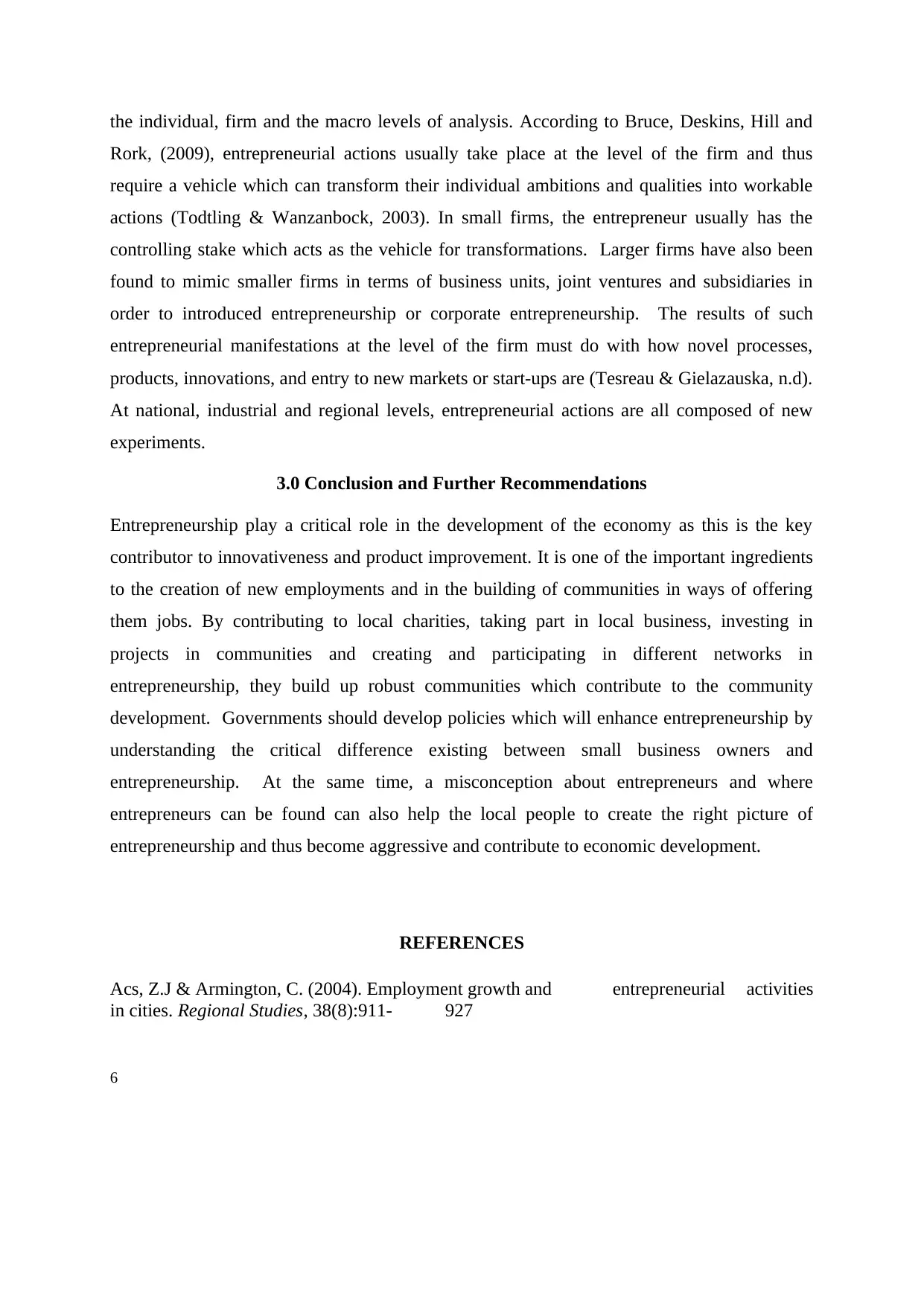
the individual, firm and the macro levels of analysis. According to Bruce, Deskins, Hill and
Rork, (2009), entrepreneurial actions usually take place at the level of the firm and thus
require a vehicle which can transform their individual ambitions and qualities into workable
actions (Todtling & Wanzanbock, 2003). In small firms, the entrepreneur usually has the
controlling stake which acts as the vehicle for transformations. Larger firms have also been
found to mimic smaller firms in terms of business units, joint ventures and subsidiaries in
order to introduced entrepreneurship or corporate entrepreneurship. The results of such
entrepreneurial manifestations at the level of the firm must do with how novel processes,
products, innovations, and entry to new markets or start-ups are (Tesreau & Gielazauska, n.d).
At national, industrial and regional levels, entrepreneurial actions are all composed of new
experiments.
3.0 Conclusion and Further Recommendations
Entrepreneurship play a critical role in the development of the economy as this is the key
contributor to innovativeness and product improvement. It is one of the important ingredients
to the creation of new employments and in the building of communities in ways of offering
them jobs. By contributing to local charities, taking part in local business, investing in
projects in communities and creating and participating in different networks in
entrepreneurship, they build up robust communities which contribute to the community
development. Governments should develop policies which will enhance entrepreneurship by
understanding the critical difference existing between small business owners and
entrepreneurship. At the same time, a misconception about entrepreneurs and where
entrepreneurs can be found can also help the local people to create the right picture of
entrepreneurship and thus become aggressive and contribute to economic development.
REFERENCES
Acs, Z.J & Armington, C. (2004). Employment growth and entrepreneurial activities
in cities. Regional Studies, 38(8):911- 927
6
Rork, (2009), entrepreneurial actions usually take place at the level of the firm and thus
require a vehicle which can transform their individual ambitions and qualities into workable
actions (Todtling & Wanzanbock, 2003). In small firms, the entrepreneur usually has the
controlling stake which acts as the vehicle for transformations. Larger firms have also been
found to mimic smaller firms in terms of business units, joint ventures and subsidiaries in
order to introduced entrepreneurship or corporate entrepreneurship. The results of such
entrepreneurial manifestations at the level of the firm must do with how novel processes,
products, innovations, and entry to new markets or start-ups are (Tesreau & Gielazauska, n.d).
At national, industrial and regional levels, entrepreneurial actions are all composed of new
experiments.
3.0 Conclusion and Further Recommendations
Entrepreneurship play a critical role in the development of the economy as this is the key
contributor to innovativeness and product improvement. It is one of the important ingredients
to the creation of new employments and in the building of communities in ways of offering
them jobs. By contributing to local charities, taking part in local business, investing in
projects in communities and creating and participating in different networks in
entrepreneurship, they build up robust communities which contribute to the community
development. Governments should develop policies which will enhance entrepreneurship by
understanding the critical difference existing between small business owners and
entrepreneurship. At the same time, a misconception about entrepreneurs and where
entrepreneurs can be found can also help the local people to create the right picture of
entrepreneurship and thus become aggressive and contribute to economic development.
REFERENCES
Acs, Z.J & Armington, C. (2004). Employment growth and entrepreneurial activities
in cities. Regional Studies, 38(8):911- 927
6
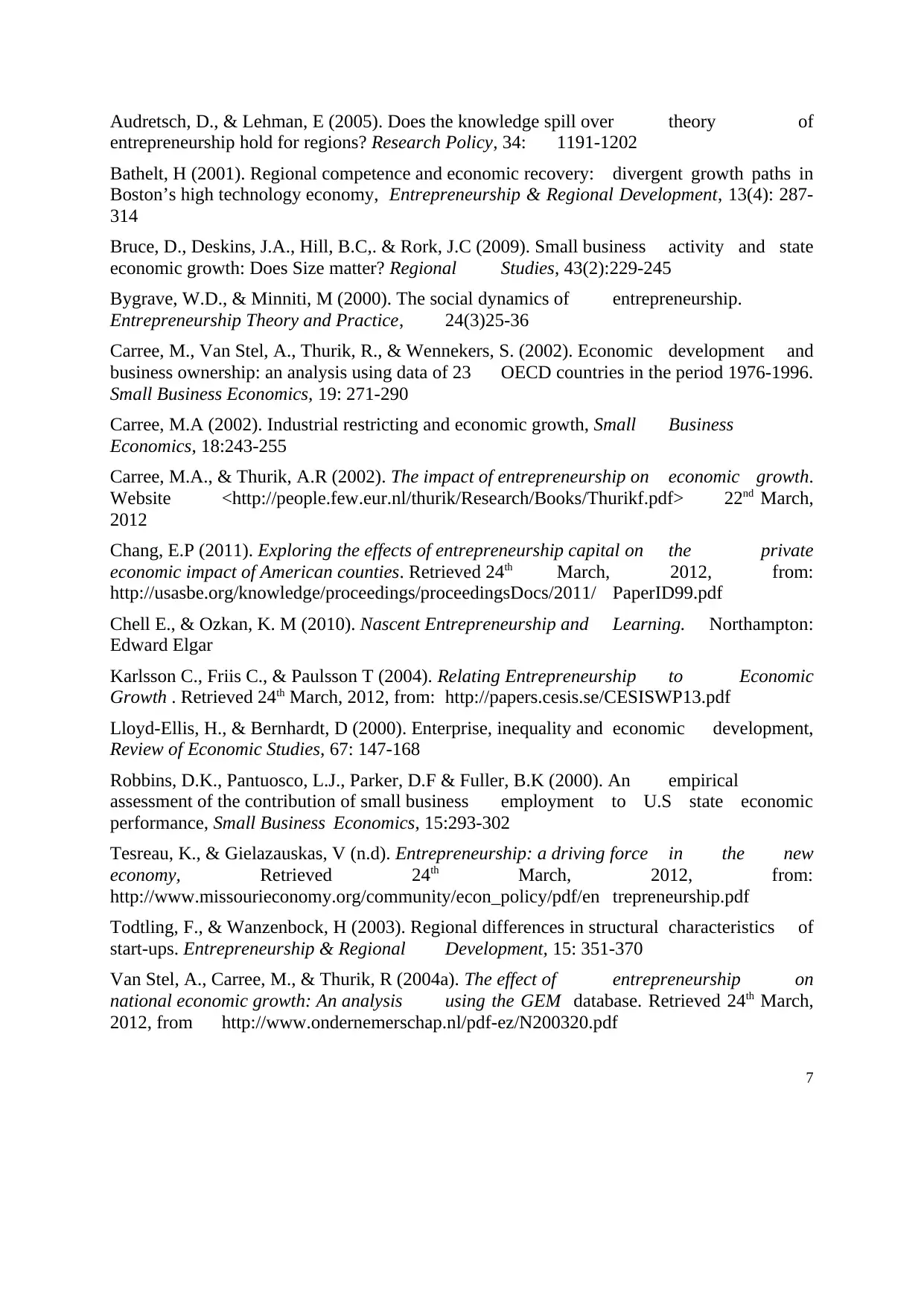
Audretsch, D., & Lehman, E (2005). Does the knowledge spill over theory of
entrepreneurship hold for regions? Research Policy, 34: 1191-1202
Bathelt, H (2001). Regional competence and economic recovery: divergent growth paths in
Boston’s high technology economy, Entrepreneurship & Regional Development, 13(4): 287-
314
Bruce, D., Deskins, J.A., Hill, B.C,. & Rork, J.C (2009). Small business activity and state
economic growth: Does Size matter? Regional Studies, 43(2):229-245
Bygrave, W.D., & Minniti, M (2000). The social dynamics of entrepreneurship.
Entrepreneurship Theory and Practice, 24(3)25-36
Carree, M., Van Stel, A., Thurik, R., & Wennekers, S. (2002). Economic development and
business ownership: an analysis using data of 23 OECD countries in the period 1976-1996.
Small Business Economics, 19: 271-290
Carree, M.A (2002). Industrial restricting and economic growth, Small Business
Economics, 18:243-255
Carree, M.A., & Thurik, A.R (2002). The impact of entrepreneurship on economic growth.
Website <http://people.few.eur.nl/thurik/Research/Books/Thurikf.pdf> 22nd March,
2012
Chang, E.P (2011). Exploring the effects of entrepreneurship capital on the private
economic impact of American counties. Retrieved 24th March, 2012, from:
http://usasbe.org/knowledge/proceedings/proceedingsDocs/2011/ PaperID99.pdf
Chell E., & Ozkan, K. M (2010). Nascent Entrepreneurship and Learning. Northampton:
Edward Elgar
Karlsson C., Friis C., & Paulsson T (2004). Relating Entrepreneurship to Economic
Growth . Retrieved 24th March, 2012, from: http://papers.cesis.se/CESISWP13.pdf
Lloyd-Ellis, H., & Bernhardt, D (2000). Enterprise, inequality and economic development,
Review of Economic Studies, 67: 147-168
Robbins, D.K., Pantuosco, L.J., Parker, D.F & Fuller, B.K (2000). An empirical
assessment of the contribution of small business employment to U.S state economic
performance, Small Business Economics, 15:293-302
Tesreau, K., & Gielazauskas, V (n.d). Entrepreneurship: a driving force in the new
economy, Retrieved 24th March, 2012, from:
http://www.missourieconomy.org/community/econ_policy/pdf/en trepreneurship.pdf
Todtling, F., & Wanzenbock, H (2003). Regional differences in structural characteristics of
start-ups. Entrepreneurship & Regional Development, 15: 351-370
Van Stel, A., Carree, M., & Thurik, R (2004a). The effect of entrepreneurship on
national economic growth: An analysis using the GEM database. Retrieved 24th March,
2012, from http://www.ondernemerschap.nl/pdf-ez/N200320.pdf
7
entrepreneurship hold for regions? Research Policy, 34: 1191-1202
Bathelt, H (2001). Regional competence and economic recovery: divergent growth paths in
Boston’s high technology economy, Entrepreneurship & Regional Development, 13(4): 287-
314
Bruce, D., Deskins, J.A., Hill, B.C,. & Rork, J.C (2009). Small business activity and state
economic growth: Does Size matter? Regional Studies, 43(2):229-245
Bygrave, W.D., & Minniti, M (2000). The social dynamics of entrepreneurship.
Entrepreneurship Theory and Practice, 24(3)25-36
Carree, M., Van Stel, A., Thurik, R., & Wennekers, S. (2002). Economic development and
business ownership: an analysis using data of 23 OECD countries in the period 1976-1996.
Small Business Economics, 19: 271-290
Carree, M.A (2002). Industrial restricting and economic growth, Small Business
Economics, 18:243-255
Carree, M.A., & Thurik, A.R (2002). The impact of entrepreneurship on economic growth.
Website <http://people.few.eur.nl/thurik/Research/Books/Thurikf.pdf> 22nd March,
2012
Chang, E.P (2011). Exploring the effects of entrepreneurship capital on the private
economic impact of American counties. Retrieved 24th March, 2012, from:
http://usasbe.org/knowledge/proceedings/proceedingsDocs/2011/ PaperID99.pdf
Chell E., & Ozkan, K. M (2010). Nascent Entrepreneurship and Learning. Northampton:
Edward Elgar
Karlsson C., Friis C., & Paulsson T (2004). Relating Entrepreneurship to Economic
Growth . Retrieved 24th March, 2012, from: http://papers.cesis.se/CESISWP13.pdf
Lloyd-Ellis, H., & Bernhardt, D (2000). Enterprise, inequality and economic development,
Review of Economic Studies, 67: 147-168
Robbins, D.K., Pantuosco, L.J., Parker, D.F & Fuller, B.K (2000). An empirical
assessment of the contribution of small business employment to U.S state economic
performance, Small Business Economics, 15:293-302
Tesreau, K., & Gielazauskas, V (n.d). Entrepreneurship: a driving force in the new
economy, Retrieved 24th March, 2012, from:
http://www.missourieconomy.org/community/econ_policy/pdf/en trepreneurship.pdf
Todtling, F., & Wanzenbock, H (2003). Regional differences in structural characteristics of
start-ups. Entrepreneurship & Regional Development, 15: 351-370
Van Stel, A., Carree, M., & Thurik, R (2004a). The effect of entrepreneurship on
national economic growth: An analysis using the GEM database. Retrieved 24th March,
2012, from http://www.ondernemerschap.nl/pdf-ez/N200320.pdf
7
Paraphrase This Document
Need a fresh take? Get an instant paraphrase of this document with our AI Paraphraser

Van Stel, A., Carree, M., & Thurik, R (2005). The effect of entrepreneurial activity on
national economic growth. Small Business Economics, 23:311-321
8
national economic growth. Small Business Economics, 23:311-321
8
1 out of 8
Related Documents
Your All-in-One AI-Powered Toolkit for Academic Success.
+13062052269
info@desklib.com
Available 24*7 on WhatsApp / Email
![[object Object]](/_next/static/media/star-bottom.7253800d.svg)
Unlock your academic potential
© 2024 | Zucol Services PVT LTD | All rights reserved.





